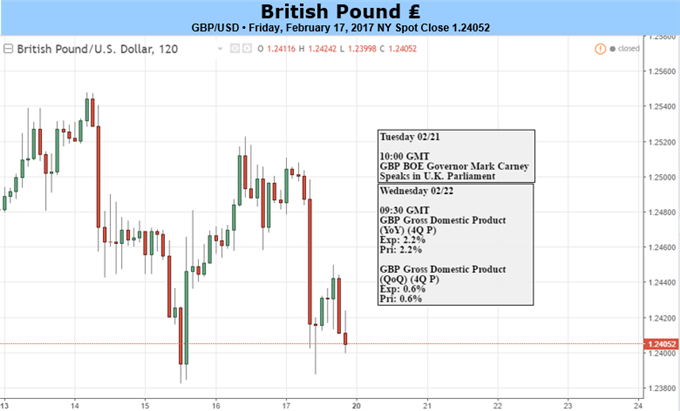British Pound Under Pressure As Inflation Begins To Bite Consumers
DailyFX.com -

Fundamental Forecast for GBP/USD: Bearish
- Evidence piling up that Brexit concerns starting to impact economy, thanks to the weak British Pound.
- Up ahead, the Brexit bill will be making its way through Parliament; the path to triggering Article 50 by the end of March looks clear.
- Crowd positioning in GBP/USD remains very bullish, a contrarian signal for further losses.
The past week was a sorry one for Sterling bulls. A host of data has failed to inspire, and the British Pound ended the week down against both the US Dollar and the Euro after failing to capitalize on the political woes facing both the Greenback and the European single currency. A review of the last week is necessary to express how the fundamental backdrop for the Sterling has deteriorated.
First up on Monday were signs that consumer spending is slowing. Credit card spending in the UK in January grew at one of the slowest annual rates of the past three years, according to data from Visa, rising 0.4% year-on-year, down from 2.5% in December. On the month, consumer spending climbed 0.5% after a 2.5% drop in December. But the data tie in with other signs that Brits are reigning in their spending. The British Retail Consortium reported last week that spending in the November-January festive period rose by the smallest amount since the financial crisis, while the Confederation of British Industry said its January retail gauge dropped by the most since records began in 1983.
The Pound was under more pressure on Tuesday after the latest UK inflation print failed to meet analysts’ expectations. CPI rose +1.8% year-on-year in January, missing expectations of a rise to +1.9%, while core inflation remained unchanged at +1.6%, against expectations of +1.7%.
The following day the UK employment report for the fourth quarter received a lukewarm reception from financial markets. Wage inflation missed expectations, rising just 2.6% year-on-year (both including and excluding bonus payments). While the unemployment rate remained unchanged at 4.8% for the October to December period, the single month rate fell to 4.6% in December, from 4.9% in November – within touching distance of the latest downward revision to the Bank of England’s estimate for the equilibrium level.
Worse was to come Friday, with more indications that rising inflation caused by the Pound’s post-Brexit vote plummet is causing Brits to reign in their spending. January UK retail sales data disappointed with the monthly numbers falling into negative territory. In January retail sales grew by +1.5% y/y, against expectations of +3.4% and a prior month’s reading of 4.1%. On a monthly basis, sales fell by -0.3% compared to expectations of a +1.0% rise and December’s fall of +2.1%.
Looking ahead, retail sales will need to rise in excess of 2% over the next two months in order to prevent retail sales dropping in Q1 and dragging on GDP growth. According to a Bloomberg poll today, investors now see a 17% chance that the Bank of England will raise UK interest rates next month. That compares with 45% at the end of last month. The Pound meanwhile dropped as low as $1.2388 after the data were released Friday, falling by the most in more than two weeks. And with so much event risk ahead, that could mean more weakness. On Monday, the House of Lords is due to look at the Brexit bill. It’s highly unlikely that peers will vote to block the bill altogether, although they may request some amendments, such as the rights of EU citizens resident in Britain, illustrating that the UK’s divorce from the EU remains an uncertain affair.
On Tuesday, investors will chew over UK public finance data. The figures are expected to show substantial flows into the Exchequer’s coffers as people pay their taxes after filling in their self-assessment forms, and that could lead to some small giveaways by Chancellor of the Exchequer Philip Hammond in his March Budget. Wednesday brings the second estimate of Q4 GDP growth and there’s a possibility of an upwards revision to 0.7% from 0.6% given the mostly stronger economic data since the first estimate was published. -OM
--- Written by Oliver Morrison, Analyst
To contact Oliver, email him at oliver.morrison@ig.com
DailyFX provides forex news and technical analysis on the trends that influence the global currency markets.
Learn forex trading with a free practice account and trading charts from IG.

 Yahoo Finance
Yahoo Finance 
